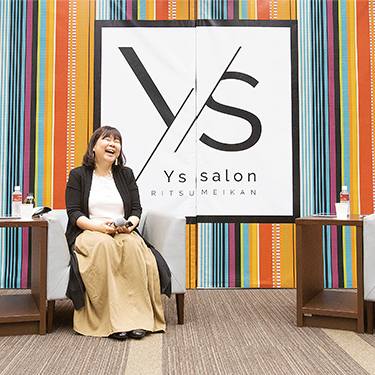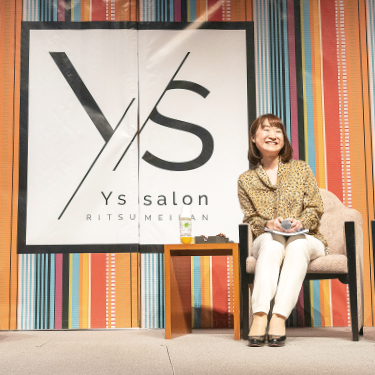
Following a report on the sharing economy of Tanzanians in Hong Kong by Professor Ogawa, Chancellor Nakatani, Vice Chancellor Matsubara and participants attending the event shared their views on the issue.
- Matsubara
- What an intriguing report that was! I’m sure everyone enjoyed it. It gave us a glimpse into a possible future of a sharing economy. It made me think that perhaps the new type of “reciprocity” seen in the underground economy in Hong Kong may really blossom into a whole new system. What did you think, Professor Nakatani?
- Nakatani
- A word “ujanja” meaning slyness and craftiness in the Swahili language appears in Professor Ogawa’s book, and in a sense, I think this word represents a kind of wisdom. Raw data collected from the world becomes “information” when value is added to the data. As more value is added, “information” evolves into “knowledge,” then finally to “wisdom.” Wisdom is something you need to survive, which is exactly what liberal arts should aim to confer to learners.
- Ogawa
- I deeply agree with what you say, that information evolves into knowledge, then finally to wisdom. As an anthropologist, I also want to take into consideration things like credibility and trust, which are not based on knowledge alone. I think the worth of anthropology research lies in searching for answers to questions like, why “trust” exits even when it cannot be measured by credibility scores; or why people enter into business relations with people they don’t trust. Matsubara I understand you studied anthropology at Kyoto University and specialized in African studies. Why did you choose to study the traders of underground economy?
- Matsubara
- I understand you studied anthropology at Kyoto University and specialized in African studies. Why did you choose to study the traders of underground economy?
- Ogawa
- Well, I am a cultural anthropologist, but I regard myself as an economic anthropologist. You see, I am interested in unusual forms of economy, particularly in gifts and exchanges. I used to study the gift economy of temples when I was an undergraduate student. I had a strong interest in informal systems, like social security mechanisms that grow spontaneously out of a community.
- Matsubara
- I see. Gifts and exchanges are very basic approaches humans take when living with others and an important theme of traditional anthropology.
- Ogawa
- When tackling issues like society, family and economy, some researchers start from the problems they are facing themselves in their approach to reach a solution, but I am not that kind. I don’t have the courage to directly tackle such problems head-on. I prefer to look elsewhere for alternative options and clues for a solution. Professor Nakatani, how do you choose your research themes?
- Nakatani
- At Nakatani Lab, we search for themes that no one else would take up. It’s difficult to explain how we find those themes, but we often pick up clues from our daily conversation. Someone would say, “hey, that might make an interesting theme!”
- Ogawa
- I know what you mean. When I go on field work, things hardly ever turn out the way I expected, no matter how much information I collect beforehand or how carefully I make plans. But quite often something that sparkles will catch my eye as I blindly grope in the dark, and I end up pursuing that as my theme.
- Matsubara
- We have been accepting questions and comments online today, some of which we will now address. The first question is “In today’s Japanese society, acting according to plans and completing one’s task to reach a pre- established harmony are the norm. However, unexpected accidents and mistakes do happen, and when they do, they are dealt with as a matter of individual responsibility.
Listening to Professor Ogawa’s insightful report, I learned that Tanzanians accept the world with all its uncertainty and live with that uncertainty, relying on mutual aid rather than individual responsibility. Is it possible for Japanese society or a capitalist world to accept the uncertainty of the world?” What do you think, Professor Ogawa?

- Ogawa
- If there’s one thing that I define as a hypothetical enemy to the kind of reciprocity I talked about today, that’s the community. It’s not that I don’t like communities, but it is so difficult to maintain a healthy reciprocal relation within a community. It can easily turn into a negative cycle of reciprocity, like “she didn’t help me when I was in trouble, so I won’t help her either.” This leads to distrust and anxiety, giving rise to the very familiar feeling that “I don’t want to either lend or borrow” and “I always want to keep things even.” Finally, people will start suspecting others, thinking “I might be losing more than gaining” or “he always seems to be taking a bigger bite.”
Why are we so short-sighted? What do we need to convince ourselves that we don’t need to balance things out on such short terms? I think one important theme would be to find an answer to these questions.




